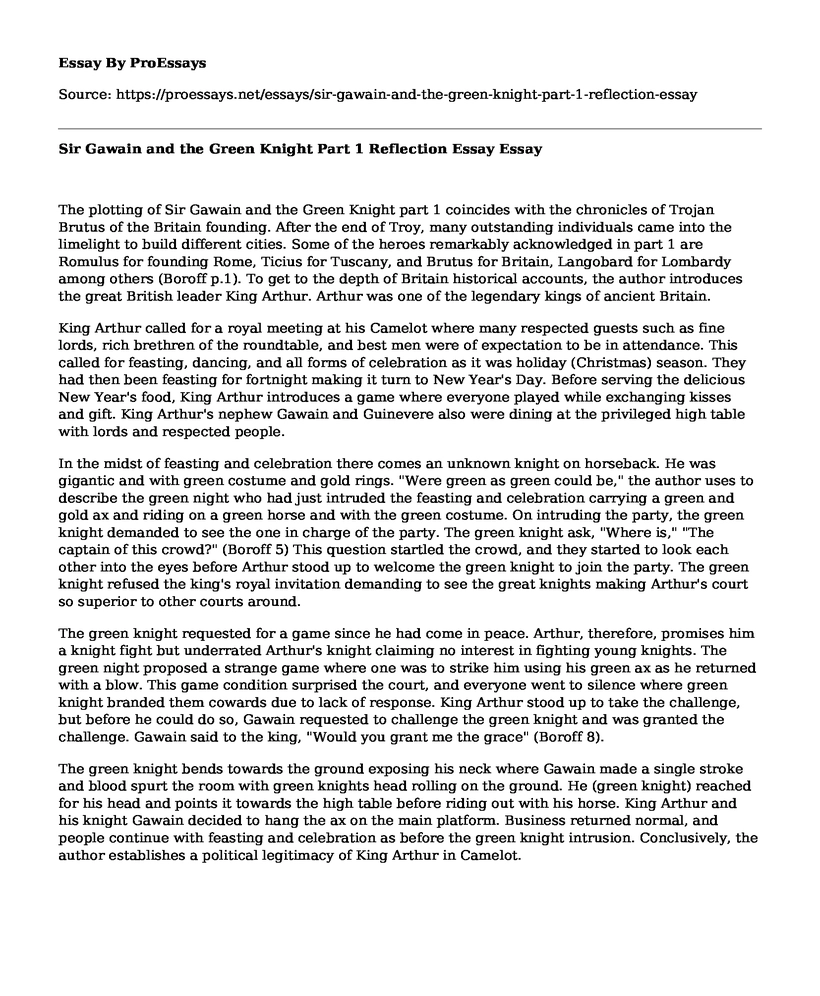The plotting of Sir Gawain and the Green Knight part 1 coincides with the chronicles of Trojan Brutus of the Britain founding. After the end of Troy, many outstanding individuals came into the limelight to build different cities. Some of the heroes remarkably acknowledged in part 1 are Romulus for founding Rome, Ticius for Tuscany, and Brutus for Britain, Langobard for Lombardy among others (Boroff p.1). To get to the depth of Britain historical accounts, the author introduces the great British leader King Arthur. Arthur was one of the legendary kings of ancient Britain.
King Arthur called for a royal meeting at his Camelot where many respected guests such as fine lords, rich brethren of the roundtable, and best men were of expectation to be in attendance. This called for feasting, dancing, and all forms of celebration as it was holiday (Christmas) season. They had then been feasting for fortnight making it turn to New Year's Day. Before serving the delicious New Year's food, King Arthur introduces a game where everyone played while exchanging kisses and gift. King Arthur's nephew Gawain and Guinevere also were dining at the privileged high table with lords and respected people.
In the midst of feasting and celebration there comes an unknown knight on horseback. He was gigantic and with green costume and gold rings. "Were green as green could be," the author uses to describe the green night who had just intruded the feasting and celebration carrying a green and gold ax and riding on a green horse and with the green costume. On intruding the party, the green knight demanded to see the one in charge of the party. The green knight ask, "Where is," "The captain of this crowd?" (Boroff 5) This question startled the crowd, and they started to look each other into the eyes before Arthur stood up to welcome the green knight to join the party. The green knight refused the king's royal invitation demanding to see the great knights making Arthur's court so superior to other courts around.
The green knight requested for a game since he had come in peace. Arthur, therefore, promises him a knight fight but underrated Arthur's knight claiming no interest in fighting young knights. The green night proposed a strange game where one was to strike him using his green ax as he returned with a blow. This game condition surprised the court, and everyone went to silence where green knight branded them cowards due to lack of response. King Arthur stood up to take the challenge, but before he could do so, Gawain requested to challenge the green knight and was granted the challenge. Gawain said to the king, "Would you grant me the grace" (Boroff 8).
The green knight bends towards the ground exposing his neck where Gawain made a single stroke and blood spurt the room with green knights head rolling on the ground. He (green knight) reached for his head and points it towards the high table before riding out with his horse. King Arthur and his knight Gawain decided to hang the ax on the main platform. Business returned normal, and people continue with feasting and celebration as before the green knight intrusion. Conclusively, the author establishes a political legitimacy of King Arthur in Camelot.
Works Cited
Boroff, Marie. "Part 1." Sir Gawain and the Green Knight: A new verse translation, Norton &Company Inc., 1967, pp. 1-11.
Cite this page
Sir Gawain and the Green Knight Part 1 Reflection Essay. (2022, May 17). Retrieved from https://proessays.net/essays/sir-gawain-and-the-green-knight-part-1-reflection-essay
If you are the original author of this essay and no longer wish to have it published on the ProEssays website, please click below to request its removal:
- Translation Analysis of "A Young Man Loves a Maiden" by Heinrich Heine
- Critical Essay on Bless Me Ultima
- The Significance of Direct and Indirect Definition of Masculinity and Femininity in Hamlet: Critical Essay
- Essay Sample on Fear & Pride: Jack's Conquest in Lord of the Flies
- Research Paper on African-American Grief & Poetry: Honoring Death in Times of Crisis
- Essay Example on Exploring the Depths of Robert Macfarlane's 'Underland': Red Dancers in Lofoten
- Mother Tongue by Amy Tan - Essay Sample







